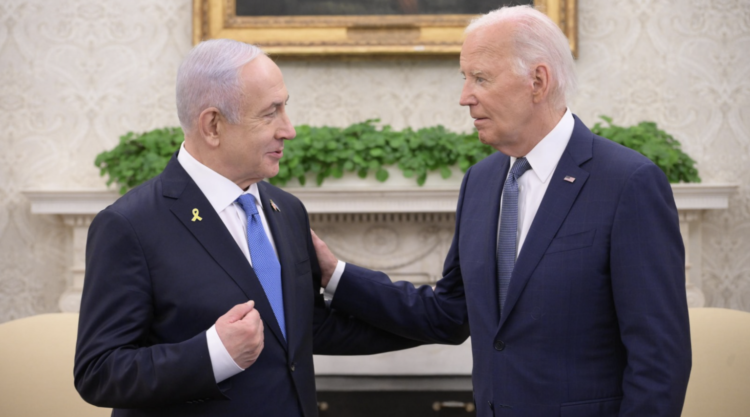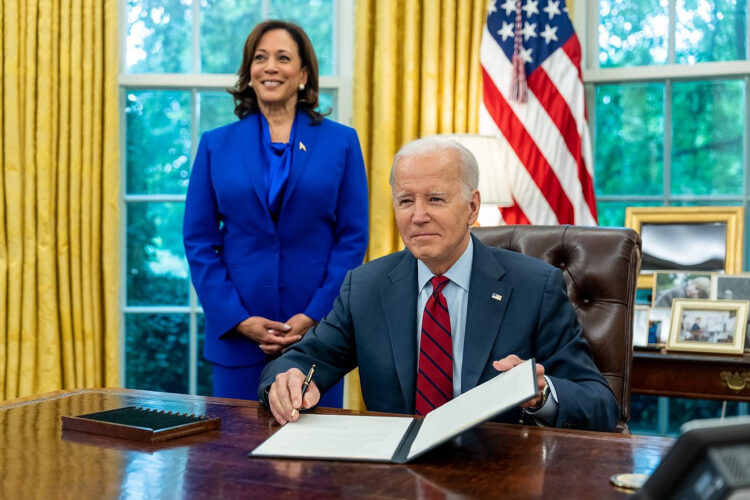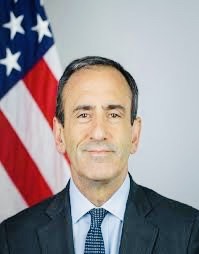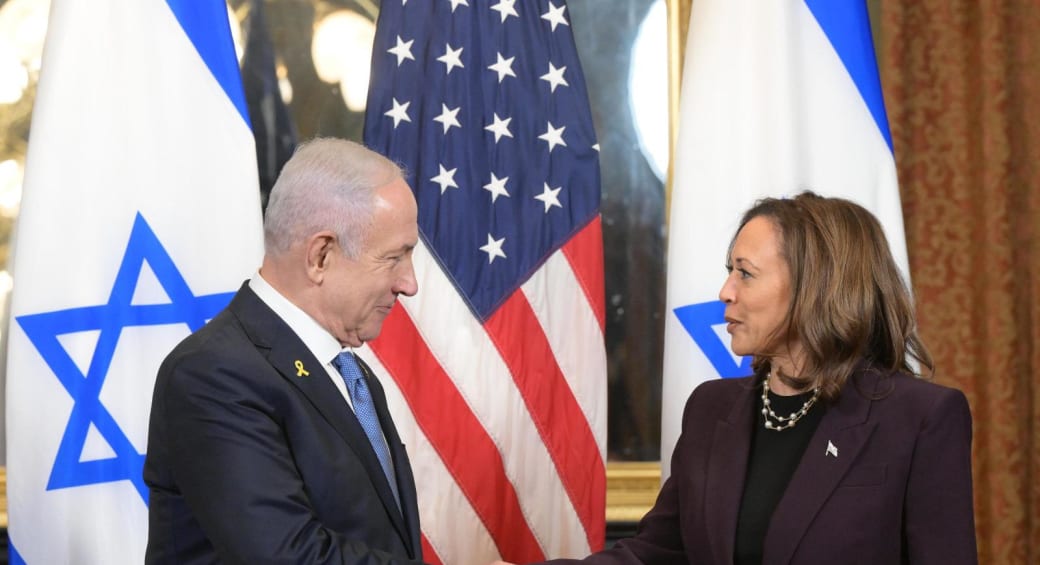Judging by her 40-minute meeting with Israeli Prime Minister Benjamin Netanyahu in Washington on July 25 and her previous comments about the Israel-Hamas war, U.S. Vice-President Kamala Harris, the presumptive Democratic presidential nominee, seems to have adopted a more balanced and critical view of Israel than Joe Biden, the outgoing president.
A few hours after Netanyahu conferred with Biden in the White House, in his first meeting with him there since he took office in 2021, Netanyahu met Harris, who most likely will be the Democratic Party’s presidential standard-bearer following Biden’s recent announcement that he will not run for a second four-year term.
Harris appeared somewhat tense in Netanyahu’s presence, not even flashing one of her trademark smiles. The atmosphere appeared cool and formal. Neither of them spoke to the media prior to their meeting. Once it was over, they did not stand together to take questions from reporters, which is usually customary when the representatives of close allies meet.
Harris, in blunt and unadorned language, called their relatively brief encounter “frank and constructive.” Which means that they probably disagreed over major issues.
By contrast, Netanyahu seemed at ease with Biden, notwithstanding their differences over Israel’s conduct of the war in the Gaza Strip, the on-again, off-again negotiations to free Israeli and foreign hostages still in Hamas’ captivity, and a two-state solution.
Prior to their 90-minute talk in the Oval Office, Netanyahu thanked Biden for his half-a-century of support for Israel.

“We’ve known each other for 40 years, and you’ve known every Israeli prime minister for 50 years since Golda Meir. From a proud Jewish Zionist to a proud Irish American Zionist, I want to thank you for 50 years of public service and 50 years of support for the state of Israel. I look forward to our discussion with you today and working with you in the months ahead on critical issues.”
Netanyahu arrived in Washington to deliver his fourth speech in 28 years to a joint session of Congress on July 24. Harris should have been in attendance as the presiding officer, but she skipped his address to attend an African-American sorority conference in Indiana. Harris’ spokesperson said that her absence “should not be interpreted as a change in her position with regard to Israel.”
Donald Trump, the former president and her Republican opponent in the forthcoming election, scoffed at Harris’ explanation, claiming she “is totally against the Jewish people.”
This was a typical Trump bluster. He seems to have forgotten that Harris’ husband, Doug Emhoff, is Jewish as well as a vocal speaker against antisemitism.
(For the record, Trump’s vice-presidential running mate, J.D. Vance, also missed Netanyahu’s speech due to an election campaign commitment).
After her meeting with Netanyahu, Harris reiterated her “longstanding and unwavering commitment to the security of the State of Israel and the people of Israel.” She supported Israel’s “right to defend itself, but how it does so matters.” She thereby echoed the nuanced policy of the Biden administration.
Like Biden, Harris insisted that a truce is necessary. “It is time for this war to end and end in a way where Israel is secure, all the hostages are released, the suffering of Palestinians in Gaza ends, and the Palestinian people can exercise their right to freedom, dignity, and self-determination,” she said.
Having met the families of Israeli hostages kidnapped by Hamas terrorists on October 7, Harris expressed solidarity with their plight. “I’ve told them each time they are not alone, and I stand with them. President Biden and I are working every day to bring them home.”
Recently, she attended a White House screening of Sheryl Sandberg’s documentary on Hamas’ sexual violence. “We cannot look away and we will not be silent,” Harris said at that event. “My heart breaks for all these survivors and their families and for all the pain and suffering … ”
Striking an empathetic tone with respect to Gaza’s civilian population, Harris said, “What has happened in Gaza over the past nine months is devastating.” She declared she would “not be silent” about Palestinian suffering.
These comments were in line with her views on the humanitarian crisis in Gaza.
Harris, however, sharply criticized pro-Palestinian protesters who gathered outside Union Station in Washington on the day of Netanyahu’s speech. Ripping down American flags, they spray- painted the words, “Hamas is coming,” on a monument.
Harris condemned these “despicable acts by unpatriotic protesters and dangerous hate-fueled rhetoric. ”
“I support the right to peacefully protest, but let’s be clear: Antisemitism, hate and violence of any kind have no place in our nation,” she said.
Earlier this year, in a reference to the students who joined pro Palestinian encampments on university campuses, she told The Nation, “They are showing exactly what the human emotion should be as a response to Gaza. There are things some of the protesters are saying that I absolutely reject … (but) I understand the emotion behind it.”
Since the outbreak of the Israel-Hamas war nearly ten months ago, Harris, the only high-ranking Biden administration official who has not travelled to Israel, has been a consistent advocate of greater empathy toward the Palestinians.
This past March, she became the first top-ranking official to call for an immediate truce, which the Israeli government has staunchly opposed. “Given the immense scale of suffering in Gaza, there must be an immediate ceasefire,” she said.
Last December, she urged Israel to “do more to protect” civilians in Gaza, saying that “international humanitarian law must be respected.”

At the Munich Security Conference this past February, Harris condemned Hamas for having used rape as a weapon of war, but said that “far too many innocent Palestinians have been killed, and that Israel must do better to protect innocent civilians.”
She also said that Israel cannot achieve peace and security without a two-state solution, a position Biden and Secretary of State Antony Blinken have consistently advanced.
Last November, she told Israeli President Isaac Herzog that extremist Jewish settlers should be held accountable for “violent acts” against Palestinians.
In March, she warned there would be “consequences” for Israel if it invaded the southern Gazan city of Rafah.
But after Iran fired a barrage of some 300 rockets and drones at Israel in April, she tweeted, “Our support for Israel’s security is iron-clad, and we stand with the people of Israel in defence against these attacks.
While Harris has not described herself as a Zionist, she claims that, “as a young girl growing up in the Bay area in California,” she raised funds for the Jewish National Fund, which was founded to buy land for Jewish settlement in Palestine. “Those of you who … are old enough, you will remember those little blue boxes, which we would walk around asking people to please donate so we could plant trees in Israel,” Harris said in a speech last year celebrating Israel’s 75th anniversary.
“And yet, that act of us as children and young people was about so much more,” she said. “It was about our sense of connection to the importance of building the state of Israel, helping the Jewish people thrive, dreaming together and willing the dream into reality.”
Harris, a former attorney-general in Calif0rnia, first travelled to Israel in 2004. She returned in 2017. While serving as its junior senator, she sponsored several pro-Israel measures in Congress.

During the 2020 election, she called for unconditional U.S. military aid to Israel.
Observers believe that Harris, if elected president, will hew to a Middle Eastern policy that may be indistinguishable from that of former president Barack Obama.
Much to Netanyahu’s chagrin, Obama supported a two-state solution and voiced criticism of Israeli settlements in the West Bank, yet he provided Israel with a $38 billion military package over ten years.

As it happens, Harris’ national security advisor, Phil Gordon, was one of Obama’s advisors on Middle East affairs.
Whether this is a coincidence remains to be seen.
